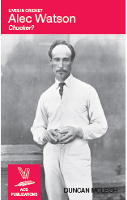Alec Watson – Chucker?
Martin Chandler |Published: 2015
Pages: 99
Author: McLeish, Duncan
Publisher: ACS
Rating: 3 stars

With the appearance Alec Watson – Chucker? the redoubtable ACS ‘Lives in Cricket’ series reaches number 39. I have to say that in some ways I do find the sub-title a little distasteful, but despite that first time author Duncan McCleish has made an auspicious debut.
This series of books has covered a few well known names over its now considerable history, former England skipper MJK Smith probably foremost amongst them, but there have been plenty of others who have graced the international game. That much conceded it has never been the intention of the series to lionise the great and the good of the game and for me at least, as a subject, Alec Watson fits the bill as just the sort of subject the format was designed for.
So who was Alec Watson? The first point to be made is that he was a Scot, born in Coatbridge in 1844. For 22 summers between 1872 and 1893 Watson played for Lancashire but, despite the impressive career record of 1,364 wickets at 13.31 no Test honours came his way, and just two appearances for the Players.
Bowlers had it easier in Watson’s time than they do now. The fact he was considered no mug with the bat despite having a career average of just 12.58 illustrates that as clearly as anything. The bare statistical bones of his career mean Watson’s lack of higher honours does at first blush appear surprising, and has always lead to speculation about his action being the cause.
McGleish begins with a thoroughly researched look at Watson’s early life and cricket in Scotland. In those days he seems to have been, in the main, a quickish right armer. In his later career in England he was primarily an off spinner. In either case, unsurprisingly given that overarm bowling was illegal when he took up the game, he was distinctly round arm in his approach.
The greater part of the book contains a season by season account of Watson’s deeds on the field. It is not, as such accounts seldom are, a riveting read, however at this distance in time McGleish has little choice, and for that reason I make no criticism of him for that approach. We learn little about Watson the man at this stage, although in the closing chapter, in which McGleish deals with what was clearly a successful business career he does, with reference to the few contemporary sources there are, attempt to go behind the statistics and discern the character of the man.
It is clear from the acknowledgments in the book that no family members have been spoken to, which struck me as a little surprising given that Watson had eight children, and thus there must be plenty of descendants around. I am assuming some at least were located, but that getting on for a hundred years after Watson’s death there was nothing to be learnt there, but the reader is not told so in terms.
The main interest in the book will inevitably lie in the chapter that examines whether or not the Watson bowling action was legal. He is a man who was never no-balled for throwing, nor does he seem to have been one of the main suspects in the widespread controversy on the subject that plagued the game and particularly Lancashire at the time. Yet despite there being little in the way of direct accusation, history seems to have attached the tag to Watson that his bowling was of questionable legitimacy.
McGleish is at his best during this analysis, the most important part of his mission. He weighs up the evidence carefully and looks at it from all relevant perspectives before coming up with the entirely convincing conclusion that Watson’s bowling, while it may well have looked a little unusual, seems likely to have been entirely fair. It is in part for that reason I am not too keen on the sub-title which, unless the book is picked up and read, is likely to serve only to perpetuate the myth that has accompanied Watson’s name as the generations have passed.
All in all the story of Alec Watson is one only for hard core followers of the Victorian game, but it is an entirely worthy addition to the series of books of which it is part. Duncan McGleish is no Cardus, but his writing is a cut above the journeyman standard and I hope he sells enough copies of Alec Watson – Chucker? to encourage him to venture into print again, and perhaps next time we could also be told just a little about the author himself.






Alec Watson, along with Lancashire stalwarts Barlow and Pilling, was a groomsman at the marriage of Johnny Briggs, to Alice Burgess, on 14 July 1885
Comment by paul mullarkey | 11:14pm BST 7 June 2015